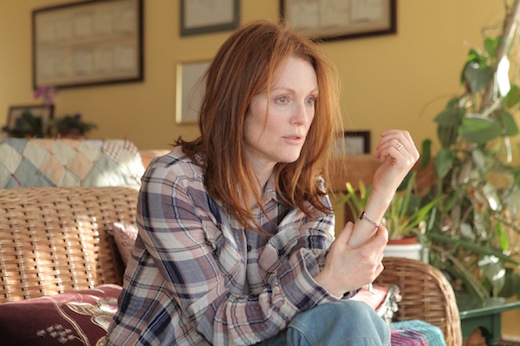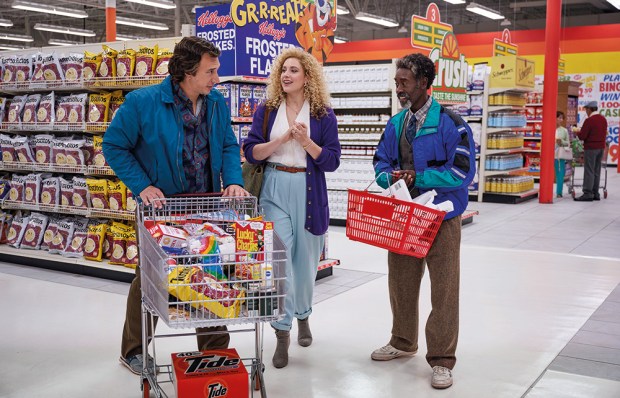There’s always seemed something masklike about Julianne Moore’s face: she seems walled in by her beauty. When she smiles, the only thing that moves is her mouth; that superb fenderwork of bone remains as impassive as a sphinx. This very inexpressiveness gives her an air of trapped intelligence, which she used to great effect in the early part of her career playing a string of numbed-out beauties— her coked-up porn actress in Boogie Nights; her neurasthenic housewives in Safe and Far from Heaven, all dying behind the eyes. More recently, she has cut loose to channel something of Diane Keaton’s scatterbrained comedy in The Kids Are All Right, in which her performance was a revelation: Moore has never been so loose or so funny. In Still Alice, she plays a victim of early-onset Alzheimer’s and you can see why they gave her an Oscar for it. It’s like watching a career retrospective only in reverse: come see the more radiant, vivacious Julianne Moore regress into one of her early pathos-of-emptiness roles. It’s one of the reasons the movie is boring: we’re watching an actor go backwards.
Moore plays Alice Howland, a 50-year-old linguistics lecturer at Columbia, author of From Neuron to Nouns, mother of three beautiful children — Anna (Kate Bosworth), Tom (Hunter Parrish) and Lydia (Kristen Stewart) — whose bejewelled Upper West Side existence indicates nothing of, nor will offer the slightest defence against, the Sophoclean cruelty of what is about to befall her. The film is at its best in these early scenes, as Alice stumbles over the odd word or name, and Moore registers little flurries of panic. Submitting to a series of questions designed to test her memory — the scene is shot in one take, with no cutaways from Moore’s face — you feel this woman’s satisfaction upon getting the questions right, and her existential distress when she doesn’t. Moore’s performance internalises the battle: an attack on her intelligence is an assault on her identity.

And therein lies both the strength and weakness of Still Alice, a character study in which the film’s sole character — the only one given any real depth— is pretty much dissipated by the end. The film doesn’t so much progress as fade away, leaving only the memory of its central performance intact. Still Alice thus joins a growing band of movies, including The Iron Lady and My Week with Marilyn, which seem plucked into existence solely to fatten up a single performance for awards season, while everyone else — the rest of the cast, director, crew — goes on a starvation diet. The people around Alice are sketches. As her husband, Alec Baldwin is patient, kind, tender and supportive but seems monumentally bored, as if someone had told him to be on his best behaviour: you can almost see him checking his watch between takes. As the more troubled misfit daughter Lydia, Kristen Stewart registers more vividly, although it’s typical of the film’s nose for classy suffering that Stewart has to recite not just a speech about misery from the final act of Chekhov’s Three Sisters, but something about transmigrating souls from Tony Kushner’s Angels in America, for good measure.
Such embellishments indicate not just a failure of nerve on the part of writer-directors Richard Glatzer and Wash Westmoreland — write your own dialogue, guys! — but their crushing levels of good taste. When it’s not fending off an attack of the glums, Still Alice comes down with a big case of the prims. There’s lots of gazing off into the middle-distance while a piano slowly chases the same four notes around the score, plus Super 8 footage of Alice, lyrically bounding around with her dead mother and sister on a beach. What is it with memories and beaches? One day someone doomed or dying in a movie will cast their mind’s eye back to their memories of a childhood in Watford, but until that day it’s back to the sand dunes and bulrushes, I’m afraid.

One scene interrupts the descent into wistfulness, as Alice, now shambling and vacant, comes across an iBook featuring taped instructions from her compos-mentis self leading her to commit suicide. It’s typical of Glatzer and Westmoreland that they score this scene with an ominous throb of violins — a reprehensibly prissy chastisement on their part, as if Alice were now the bad guy for her wish. But the scene that plays out, with Alice unable to remember even the instructions she gives herself, is good enough that, briefly, you imagine yourself in a much better movie, one with the poetry to release all the wildness and heartbreak lurking within this one’s trim, tidy borders.
Got something to add? Join the discussion and comment below.
Get 10 issues for just $10
Subscribe to The Spectator Australia today for the next 10 magazine issues, plus full online access, for just $10.
You might disagree with half of it, but you’ll enjoy reading all of it. Try your first month for free, then just $2 a week for the remainder of your first year.













Comments
Don't miss out
Join the conversation with other Spectator Australia readers. Subscribe to leave a comment.
SUBSCRIBEAlready a subscriber? Log in